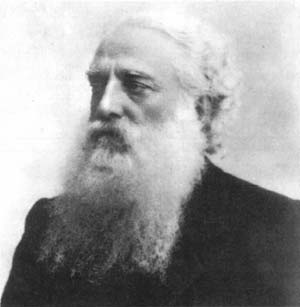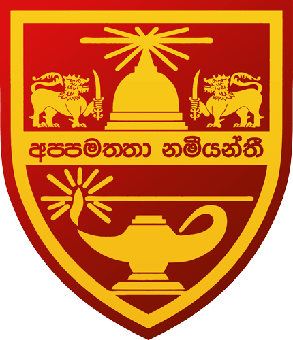
Colonel Henry Steel Olcott was an American military officer, journalist, lawyer, Freemason and the co-founder and first president of the Theosophical Society.

Gampaha is an urban city in Gampaha District, Western Province, Sri Lanka. It is situated to the north-east of the capital Colombo. It is the sixth largest urban area in Western Province, after Colombo, Negombo, Kalutara, Panadura and Avissawella. Gampaha is also the second largest municipal centre in Gampaha district, after Negombo. Gampaha has a land area of 25.8 ha and is home to the offices of 75 government institutions.

Education in Sri Lanka has a long history that dates back two millennia. While the Constitution of Sri Lanka does not provide free education as a fundamental right, the constitution mentions that 'the complete eradication of illiteracy and the assurance to all persons of the right to universal and equal access to education at all levels" in its section on directive principles of state policy at (27. Sri Lanka's population had an adult literacy rate of 96.3% in 2015, which is above average by world and regional standards. Computer literacy in 2017 28.3% and phone users in 2017 105%, website users 32% in 2017. Education plays a major part in the life and culture of the country, which dates back to 543 BC. Sri Lanka's modern educational system modeled after Christian missionary system was brought about by its integration into the British Empire in the 19th century. Education currently falls under the control of both the Central Government and the Provincial Councils, with some responsibilities lying with the Central Government and the Provincial Council having autonomy for others.

Maliyadeva College is a national school controlled by the Sri Lankan central government. It is located in Kurunegala, Sri Lanka, and was established in 1888 by the Buddhist Theosophical Society, led by Colonel Henry Steel Olcott. It is one of Sri Lanka's oldest schools. Today, the school accommodates 4,000 students. The term "Devans" is used to refer to the former and present pupils of Maliyadeva College.

Dharmaraja College, founded in 1887, is a boys' school in Kandy, Sri Lanka. It is a Buddhist school with around 300+ teaching staff and over 4,000+ students. The school has many notable alumni including the first President of Sri Lanka William Gopallawa, A. E. Goonesinha, T.B Kehelgamuwa, Chamara Kapugedera, Sudarshana Pathirana and others.

Mahinda College is a Buddhist boys' school in Galle, Sri Lanka. The school was established on 1 March 1892 by the Buddhist Theosophical Society led by Colonel Henry Steel Olcott. As of today it is a national school which provides primary and secondary education across 13 grades to a student population of over 5300.

Patrick de Silva Kularatne was a Sri Lankan educationist and politician. He was a Member of the State Council of Ceylon (1942-1947) and Member of Parliament (1960-1965). He served as Principal of Ananda College and Dharmaraja College and established Nalanda College Colombo, Ananda Balika Vidyalaya, Moratuwa Vidyalaya and Dharmapala Vidyalaya. As a member of the executive committee on Education, he played an instrumental role in the realisation of free education from kindergarten to university.

Sujatha Vidyalaya is a girls' school in Matara, Sri Lanka. The Matara Buddhist Society founded the school as a private Buddhist institution in 1929. It was the first Buddhist girls' school in Matara. Today, the Government of Sri Lanka operates Sujatha Vidyalaya as a national school; it was one of the initial group of schools to receive this designation.

Panadura is a main city in Kalutara District, Western Province in Sri Lanka. It is located approximately 27 km (17 mi) south of Colombo. Panadura is surrounded on all sides by water; the Indian Ocean, the Bolgoda Lake and river is reason for that. Panadura is famed as the location of important events in the Buddhist revival movement of Sri Lanka. Panadura Beach is an attractive place for local and foreign tourists.

Dharmapala Vidyalaya, Pannipitiya, established in 1942 and it is the largest co-educational institution and the most populated suburban school in Sri Lanka. The school is situated on a land donated by Anagarika Dharmapala, whom the school is named after. The school was upgraded to National school status in 1991.

Ananda Sastralaya is a public boys school located in Kotte, Sri Lanka. It was founded in 1890 as Kotte Buddhist English Mixed School. In 1952 a part of the school land was designated by the Government as an archaeological site since an underground residence of a Buddhist place of worship was discovered at the site.
The Scholarship Examination is a highly competitive Sri Lankan examination first introduced in 1947, conducted by the Department of Examinations of the Ministry of Education. It is optional for students to undertake it during the final year of primary school. Based on the results of the exam, students could transfer to prominent national schools. The exams are held in two mediums: Sinhala and Tamil.

Musaeus College is a Buddhist private girls' school in Colombo, Sri Lanka. The school is named after its founding principal, Marie Musaeus Higgins from Wismar, Germany, who served as the school's principal from 1891 to 1926. Musaeus College provides primary and secondary education to more than 6,500 girls from ages 3 to 18, and is managed by a board of trustees. The school's motto is "Follow the Light".
Piliyandala Central College is a selective entry mixed-gender school located in Piliyandala, Sri Lanka. It was the first government-run mixed-gender secondary school in the country.

Kalutara Vidyalaya is a Buddhist boys' school in Kalutara, Sri Lanka. The college was founded in 1941 by Sir Cyril de Zoysa. It is a national school providing primary and secondary education.
Kegalu Balika Vidyalaya is a National Buddhist girls' School in Kegalle, Sri Lanka.

Kalutara Koralalage Edward Winifred Brito Adikaram was an educationalist, writer, social activist and a philosopher in Sri Lanka. In 1931 he obtained an M.A degree from London School of Oriental Studies and in 1933 a PhD on the thesis "Early History of Buddhism in Ceylon". After returning to Sri Lanka he started to teach in Ananda Sastralaya, Kotte and in 1934, he became the principal of the school. He was a prominent non-violent activist in Sri Lanka.

Henry Woodward Amarasuriya was a Ceylonese plantation owner, politician, educationist and philanthropist. He was the Cabinet Minister for Trade and Commerce in the cabinet of D. S. Senanayake. A former member of the Ceylon state council, H. W. Amarasuriya was a founding member and the first general secretary of the United National Party. He also held the position of Deputy Speaker and Chairman of Committees in the first parliament of Ceylon. A member of the first Education Executive Committee of the state council and a former general manager of the Buddhist schools, he did a great service to improve the education in Ceylon.

Pushpadana Girls' College is a Girls' school located in Kandy, Sri Lanka, founded in 1942 by the Sri Pushpadana Society, Kandy. Pushpadana Girls' College is situated within the historical city of Kandy.

Sri Devananda College is a co-educational school in Ambalangoda in the Southern Province of Sri Lanka. The current principal is Janaka Peduruheva.
















